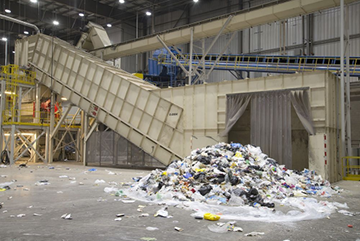Waste Conversion Technologies | Biomass Conversion Technologies
Waste conversion technologies include gasification, plasma gasification, plasma arc gasification, torrefaction, pyrolysis, thermal depolymerization, anaerobic digestion, mechanical biological treatment (MBT), and fermentation. These technologies convert waste into fuels such as syngas, methane, methanol, cellulosic ethanol, biodiesel, other biofuels, other second-generation liquid transportation fuels, or pellets.

Waste conversion technologies are implemented in place of the more traditional incineration of waste with little or no preprocessing. This direct combustion of waste produces heat to boil water, which produces steam, to power turbines that generate electricity. Current battery technology makes the storage of large volumes of electricity, for long time periods - at best inefficient and at worst impossible. The main advantage of converting waste into fuels is that these fuels can be stored more effectively, more efficiently, and for longer periods of time.
Processing and preparing the waste stream prior to its conversion to fuel is an integral part of advanced waste conversion plants. Vecoplan has experience in the design, engineering and construction of machinery and systems for commercial, industrial, and municipal waste-to-fuel plants.
Vecoplan systems operate in municipal facilities for the production of liquid transportation fuels from MSW (municipal solid waste) residuals. Vecoplan has equipment used in factories that process paper and plastics waste to produce alternative fuel pellets. Vecoplan machinery is incorporated into plants that convert agricultural wastes, such as corn stover, into cellulosic ethanol. Cement plants use Vecoplan (RDF) refuse derived fuel systems to produce fuel for their kilns. Some of the worlds largest wood pellet factories use Vecoplan machinery, also.
Vecoplan delivers turnkey systems that process waste as a feedstock for waste conversion technologies. The equipment included in our systems is determined by the composition of the waste feeding into the system and the specifications required on the prepared material that will be fed into a particular waste conversion technology. Machinery and technologies available from Vecoplan for waste conversion prep systems includes: Receiving stations, Primary size reduction, Screening, Air classification, Metals separation, Optical sorting, Secondary shredding, Storage, Testing, Metered feeding, Conveying between workstations, and Integrated controls for the entire system. Most systems employ some, but not all of these. Knowing which to specify and how to incorporate the best technologies to get the job done is the key to success. Vecoplan has this expertise.
Bottom line - no matter what type of waste you’re starting with, what type of waste conversion technology you’re using, or what kind of fuel you’re making, no one can match the experience that you get with Vecoplan.
